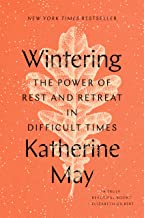Wintering: The Power of Rest and Retreat in Difficult Times by Katherine May 2020
This book puzzled me. I was drawn to its title. First because the need for ‘rest and retreat’ seems to be nearly infinite in this time of COVID and because I’ve been an intermittent meditator, seeking ‘rest and retreat’ in mindfulness for some years now. Second, living in Vermont nearly full time for the last two winters, I’ve been increasingly fascinated by the demands and beauties of this season of cold, ice and snow, and at time seemingly endless darkness (as I type this, it is 6AM and pitch dark outside my window!). Do we welcome this interruption in the physical work of the summer with its gardening, hiking, camping, etc or do our spirits sag as we hunker down under the quilt, and try to find happiness in books, email, and yes, spirits?
What puzzled me about May’s book is that I couldn’t exactly fit it into any neat little box. Is it a memoir? Is it a self-help book? Is it a diary of her travels to Iceland, Finland and other wintry locales? And at the end of the day, who is Katherine May? She begins the book with a harrowing tale of her husband’s bout with a burst appendix and the National Health Service but H (we never learn his name, but are left with H which may stand for ‘husband’) never reappears in the rest of the book except for a rare reference that indicated that he was still in the picture. I found this constant wondering about where H is to be disorienting and distracting.
And then there’s May herself, variously self-described as having Asperger’s, being clinically depressed, leaving her job as a professor (though we never learn what discipline she professes in!), suffering from irritable bowel syndrome, a mother of Bertie who also seems to have his issues with behavior and mood, etc. I was too distracted by trying to figure out who May was to focus on her advice for wintering, i.e. for hibernating or at least cooling down at times of stress so as to manage the complexities and demands of life which are always unpredictable and challenging.
On the other hand, there are some beautiful images, phrases, and similes among all of this confusing stuff. I love her references to the ‘voiceless awe at the passing of time’, ‘happiness is the greatest skill we’ll ever learn’, and her description of snow as creating ‘that quality of awe in the face of a power greater than ours.” The writing is quite powerful and lovely, but for me, it got lost in the muddle of the book’s structure.
Her solution for much of this tumult is mindfulness and meditation, pretty much the same old, same old that has been the recommendation of gurus from Alan Watts (who she references) to Jon Kabat-Zinn, Tara Brach, and the rest of that crew. I’m a believer, but it’s not because of May’s book which ultimately, I found unsatisfying. It has received some rave reviews (https://www.nytimes.com/2020/12/22/books/review-wintering-katherine-may.html), so give it a try if it’s dark and cold outside and you have misplaced your Thomas Perry thriller or Virgil’s Georgics.



